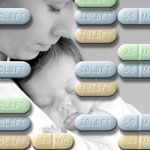Generic Zoloft Manufacturers Not Liable for Birth Defects
 The Food and Drug Administration (FDA) approved Zoloft (sertraline) in 1991; 15 years later, when manufacturer Pfizer’s patent expired, the FDA approved the first sertraline generics. At the time, Gary J. Buehler, Director of the Office of Generic Drugs, emphasized that generics were a safe and economical alternative to brand-name drugs. Five years later, a U.S. Supreme Court ruling challenged that statement, finding that generic drug manufacturers could not be held liable for failure to warn. This decision would have profound effects of patients planning to file a birth defects lawsuit for generic Zoloft.
The Food and Drug Administration (FDA) approved Zoloft (sertraline) in 1991; 15 years later, when manufacturer Pfizer’s patent expired, the FDA approved the first sertraline generics. At the time, Gary J. Buehler, Director of the Office of Generic Drugs, emphasized that generics were a safe and economical alternative to brand-name drugs. Five years later, a U.S. Supreme Court ruling challenged that statement, finding that generic drug manufacturers could not be held liable for failure to warn. This decision would have profound effects of patients planning to file a birth defects lawsuit for generic Zoloft.
FDA approves “safe” generic alternatives to Zoloft
On June 30, 2006, the FDA announced that it had approved the first generic version of sertraline. Their statement noted that Zoloft, a selective serotonin reuptake inhibitor (SSRI) antidepressant, was the sixth bestselling brand-name drug in the United States during 2005; that year, Zoloft raked in a cool $2.5 billion in retail sales. The newly approved generic, manufactured by IVAX Pharmaceuticals (later acquired by Teva Pharmaceuticals), would offer the benefits of Zoloft at a fraction of the cost. The generic was offered in 25-, 50-, and 100-milligram doses. Later, Pfizer, the manufacturer of Zoloft, also released a generic version through its subsidiary Greenstone Ltd.
Babies born with birth defects after Zoloft use
Both Zoloft and sertraline generics manifest similar side effects, which include a range of birth defects after Zoloft use. Though not all pregnant women taking Zoloft will give birth to a child with birth defects, some babies may develop atrial heart defects, persistent pulmonary hypertension of the newborn, limb abnormalities including clubfoot, abdominal defects, and cranial defects.
Congressional bill would allow generic patients to file a birth defects lawsuit
Many parents who wish to file a birth defects lawsuit have already found it to be a difficult process. For women who took generic forms of Zoloft, the 2011 U.S. Supreme Court ruling makes it all but impossible to successfully file a complaint. However, legislation proposed to Congress in April 2012 hopes to change this law, allowing generic manufacturers to compose their own warning labels – currently, they must be carbon copies of the brand-name label – and therefore make generic manufacturers liable for their drugs’ side effects. If this bill passes, victims would be able to file a birth defects lawsuit for generic versions of Zoloft.
[SmartLink zoloftlawsuit]

